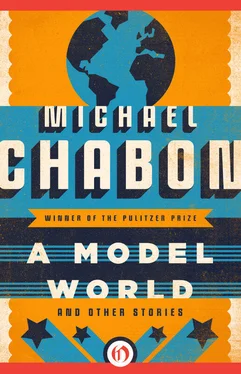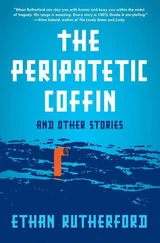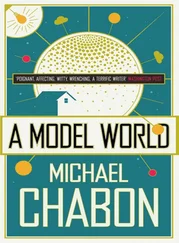Michael Chabon - A Model World And Other Stories
Здесь есть возможность читать онлайн «Michael Chabon - A Model World And Other Stories» — ознакомительный отрывок электронной книги совершенно бесплатно, а после прочтения отрывка купить полную версию. В некоторых случаях можно слушать аудио, скачать через торрент в формате fb2 и присутствует краткое содержание. Год выпуска: 2011, Издательство: Open Road Media, Жанр: Современная проза, на английском языке. Описание произведения, (предисловие) а так же отзывы посетителей доступны на портале библиотеки ЛибКат.
- Название:A Model World And Other Stories
- Автор:
- Издательство:Open Road Media
- Жанр:
- Год:2011
- ISBN:нет данных
- Рейтинг книги:5 / 5. Голосов: 1
-
Избранное:Добавить в избранное
- Отзывы:
-
Ваша оценка:
- 100
- 1
- 2
- 3
- 4
- 5
A Model World And Other Stories: краткое содержание, описание и аннотация
Предлагаем к чтению аннотацию, описание, краткое содержание или предисловие (зависит от того, что написал сам автор книги «A Model World And Other Stories»). Если вы не нашли необходимую информацию о книге — напишите в комментариях, мы постараемся отыскать её.
A Model World And Other Stories — читать онлайн ознакомительный отрывок
Ниже представлен текст книги, разбитый по страницам. Система сохранения места последней прочитанной страницы, позволяет с удобством читать онлайн бесплатно книгу «A Model World And Other Stories», без необходимости каждый раз заново искать на чём Вы остановились. Поставьте закладку, и сможете в любой момент перейти на страницу, на которой закончили чтение.
Интервал:
Закладка:
He awoke very early on Wednesday morning, went into the cottage’s small kitchen, where the floor was sticky and the table rocked and trembled, and chose the last of the desirable cereals from the Variety pack, leaving for Ricky only those papery, sour brands with the scientific names — the sort that their grandparents liked. As he began to eat, Nathan heard, from the big bedroom down the hall, the unmistakable, increasingly familiar sound of his father burying his mother under a heap of scorn and ridicule. It was, oddly, a soft and pleading sound. Lately, the conversation and actions of Dr. Shapiro’s family seemed to disappoint him terribly. His left hand was always flying up to smack his sad and outraged forehead, so hard that Nathan often thought he could hear his father’s wedding ring crack against his skull. When they’d played their baseball game the day before — Nathan’s Baltimore Bonfires against his father’s Brooklyn Eagles — every decision Nathan made led to a disaster, and his father pointed out each unwise substitution and foolish attempt to steal in this new tone of miserable sarcasm, so that Nathan had spent the afternoon apologizing, and, finally, crying. Now he listened for his mother’s voice, for the note of chastened shame.
The bedroom door slammed, and Mrs. Shapiro came out into the kitchen. She was in her bathrobe, a wild, sleepless smile on her face.
“Good morning, honey,” she said, then hummed to herself as she boiled water and made a cup of instant coffee. Her spoon tinkled gaily against the cup.
“Where are you going, Mom?” said Nathan. She had taken up her coffee and was heading for the sliding glass door that led out of the kitchen and down to the beach.
“See you, honey,” she sang.
“Mom!” said Nathan. He stood up — afraid, absurdly, that she might be leaving for good, because she seemed so happy. After a few seconds he heard her whistling, and he went to the door and pressed his face against the wire screen. His mother had a Disney whistle, melodious and full, like a Scotsman’s as he walks across a meadow in a brilliant kilt. She paced briskly along the ramshackle slat-and-wire fence, back and forth through the beach grass, drinking from the huge white mug of coffee and whistling heartily into the breeze; her red hair rose from her head and trailed like a defiant banner. He watched her observe the sunrise — it was going to be a perfect, breezy day — then continued to watch as she set her coffee on the ground, removed her bathrobe, and, in her bathing suit, began to engage in a long series of yoga exercises — a new fad of hers — as though she were playing statues all alone. Nathan was soon lost, with the fervor of a young scientist, in contemplation of his pretty, whistling mother rolling around on the ground.
“Oh, how can she?” said Dr. Shapiro.
“Yes,” said Nathan, gravely, before he blushed and whirled around to find his father, in pajamas, staring out at Mrs. Shapiro. His smile was angry and clenched, but in his eyes was the same look of bleak surprise, of betrayal, that had been there when Nathan took out Johnny Sain, a slugging pitcher, and the pinch-hitter, Enos Slaughter, immediately went down on strikes. There were a hundred new things that interested Nathan’s mother — bonsai, the Zuni, yoga, real estate — and although Dr. Shapiro had always been a liberal, generous, encouraging man (as Nathan had heard his mother say to a friend), and had at first happily helped her to purchase the necessary manuals, supplies, and coffee-table books, lately each new fad seemed to come as a blow to him — a going astray, a false step.
“How can she?” he said again, shaking his big bearded head.
“She says it’s really good for you,” said Nathan.
His father smiled down on his son ruefully, and tapped him once on the head. Then he turned and went to the refrigerator, hitching up his pajama bottoms. They were the ones patterned with a blue stripe and red chevrons — the ones that Nathan always imagined were the sort worn by the awkward, doomed elephant in the Groucho Marx joke.
Later that day, as they made egg-salad sandwiches to carry down to the beach, Dr. and Mrs. Shapiro fought bitterly, for the fifth time since their arrival. In the cottage’s kitchen was a knife — a small, new, foreign knife, which Mrs. Shapiro admired. As she used it to slice neat little horseshoes of celery, she praised it again. “Such a good little knife,” she said. “Why don’t you just take it?” said Dr. Shapiro. The air in the kitchen was suddenly full of sharp, caramel smoke, and Dr. Shapiro ran to unplug the toaster.
“That would be stealing,” said Nathan’s mother, ignoring her husband’s motions of alarm and the fact that their lunch was on fire. “We are not taking this knife, Martin.”
“Give it to me.” Dr. Shapiro held out his hand, palm up.
“I’m not going to let you — make me — dishonest anymore!” said his mother. She seemed to struggle, at first, not to finish the sentence she had begun, but in the end she turned, put her face right up to his, and cried out boldly. After her outburst, both adults turned to look, with a simultaneity that was almost funny, at their sons. Nathan hadn’t the faintest notion of what his mother was talking about.
“Don’t steal, Dad,” Ricky said.
“I only wanted it to extract the piece of toast,” said their father. He was looking at their mother again. “God damn it.” He turned and went out of the kitchen.
Her knuckles white around the handle of the knife, their mother freed the toast and began scraping the burnt surfaces into the sink. Because their father had said “God damn,” Ricky wiggled his eyebrows and smiled at Nathan. At the slamming of the bedroom door, Nathan clambered up suddenly from the rickety kitchen table as though he had found an insect crawling on his leg.
“Kill it!” said Ricky. “What is it?”
“What is it?” said his mother. She scanned Nathan’s body quickly, one hand half raised to swat.
“Nothing,” said Nathan. He took off his glasses. “I’m going for a walk.”
When he got to the edge of the water, he turned to look toward the Sandpiper. At that time in Nags Head there were few hotels and no condominiums, and it seemed to Nathan that their little ring of cottages stood alone, like Stonehenge, in the middle of a giant wasteland. He set off down the beach, watching his feet print and following the script left in the sand by the birds for which the motel was named. He passed a sand castle, then a heart drawn with a stick enclosing the names Jimmy and Beth. Sometimes his heels sank deeply into the sand, and he noticed the odd marks this would leave — a pair of wide dimples. He discovered that he could walk entirely on his heels, and his trail became two lines of big periods. If he took short steps, it looked as though a creature — a bird with two peg legs — had come to fish along the shore.
He lurched a long way in this fashion, watching his feet, and nearly forgot his parents’ quarrel. But when at last he grew bored with walking on his heels and turned to go back, he saw that his mother and father had also decided to take a walk, and that they were, in fact, coming toward him — clasping hands, letting go, clasping hands again. Nathan ran to meet them, and they parted to let him walk between them. They all continued down the beach, stooping to pick up shells, glass, dead crabs, twine, and all the colored or smelly things that Nathan had failed to take note of before. At first his parents exclaimed with him over these discoveries, and his father took each striped seashell into his hands, to keep it safe, until there were two dozen and they jingled there like money. But after a while they seemed to lose interest, and Nathan found himself walking a few feet ahead of them, stooping alone, glumly dusting his toes with sand as he tried to eavesdrop on their careless and incomprehensible conversation.
Читать дальшеИнтервал:
Закладка:
Похожие книги на «A Model World And Other Stories»
Представляем Вашему вниманию похожие книги на «A Model World And Other Stories» списком для выбора. Мы отобрали схожую по названию и смыслу литературу в надежде предоставить читателям больше вариантов отыскать новые, интересные, ещё непрочитанные произведения.
Обсуждение, отзывы о книге «A Model World And Other Stories» и просто собственные мнения читателей. Оставьте ваши комментарии, напишите, что Вы думаете о произведении, его смысле или главных героях. Укажите что конкретно понравилось, а что нет, и почему Вы так считаете.












